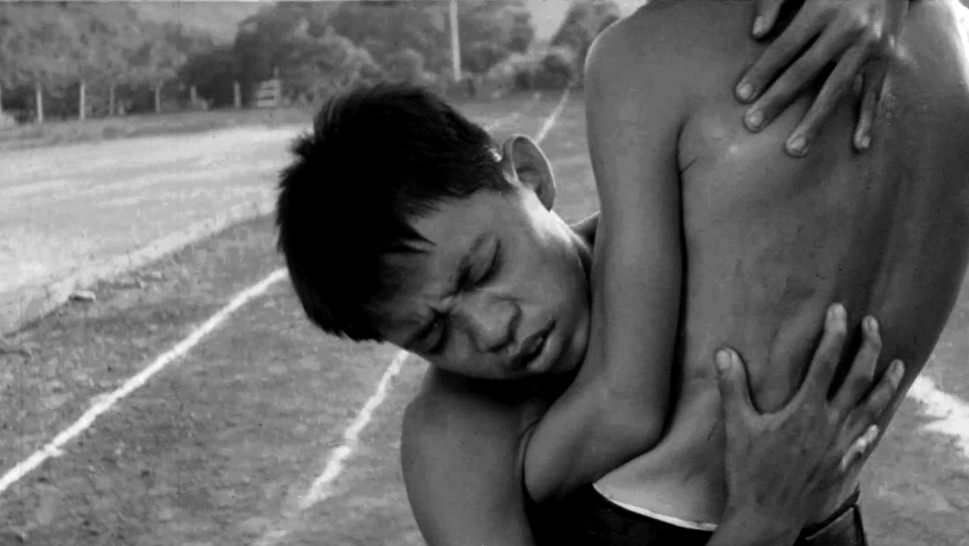
Tabooed Initiation: Two Early Films by Mou Tun-fei
In the 1966 documentary The Mountain, three carefree students at Taiwan’s National Arts Institute make an excursion into the mountains. Through the freely edited, intentionally disjunctive images set to the lively soundtrack “California Dreamin',” the trio exchanges thoughts about their artistic ambitions, friendship, love, and, insouciantly, the ongoing Vietnam War. One student is asked about his future career, to which he brazenly answers: “If I can’t become a director, I would rather die!” This was Mou Tun-fei (1941-2019). Born in mainland China and relocating to Taiwan following the Chinese Civil War, Mou would later make a name for himself in the 1980s as a sexploitation filmmaker associated with the Hong Kong powerhouse Shaw Brothers. Sometimes dubbed “the bestial director,” Mou is mostly known for representing a raw and robust facet of Hong Kong cinema, working within the audacious language of New Wave experimentation as well as the crude aesthetics of soft-core productions.
We are little aware, however, of Mou’s directorial debut in Taiwan. Made with a meager budget, and just three years after the student trip, I Didn’t Dare Tell You (1969) is a socially conscious film portraying the cumbersome relationships between a schoolboy, his gambling father, and his righteous teacher. While I Didn’t Dare Tell You received warm reviews from critics, the film was immediately censored because it presumably depicted an illicit affair between teacher and student. Here also, Taiwanese cinema’s familiar sentimental mode exchanges for a brutal realism interrogating subjects of child labor and state negligence. Strong leftist undertones implicitly directed criticism at the authoritarian state apparatus, further withdrawing the film from visibility. But before Mou’s Taiwan career would be disparaged, he followed with the 1970 debut of The End of the Track, a bolder, more provocative successor: two schoolboys’ world of tenderness withers into volatility in the aftermath of a traumatic accident. Timely social issues are expropriated to the toiling body – in psychological tremors, as an abundance of sweat. Pronounced homoerotic undercurrents were feared to have an adverse impact on Taiwanese youth, and this film, too, was promptly banned.
Despite being first features, and in spite of state censorship, the films evidence Mou’s astute approach to social issues and a dexterous command of cinematic style. Both stories play out against the backdrop of economic inequity, familial alienation, and the industrialized cityscape, scenography redolent of Taiwan’s integration into global capitalism. Apprenticing under the Italian-trained Pai Ching-jui, Mou echoes the neorealist themes and aesthetic championed by Vittorio De Sica, his dramatic treatments of landscape and mise-en-scène recalling those of Michelangelo Antonioni. A thematic focus on youthful vitality threaded through an impetus for formal experimentation further reflects the passion of this generation of artists who were closely attuned to avant-garde and New Wave cultures unfolding on the global stage. As the earliest independent works outside Taiwan’s state-backed production system, Mou’s two early films boast a realist style that not only sharply contrasted with the official “healthy realism” of the state, which aimed to promote ethical social relations through cheerful melodrama, but also anticipated the arrival of Taiwan New Cinema a decade later.
Recently discovered by Taiwan’s Film Institute, I Didn’t Dare Tell You and The End of the Track debuted at the 2018 Taiwan International Documentary Festival and have since toured the world. Encompassing a wide affective spectrum—from repressed yearning to mournful regrets, from abusive love to homoerotic desire—they represent the tabooed initiation of a visionary director whose versatile career we have yet to fully appreciate. —Tim Teng and Shaowen Zhang
Tabooed Initiation includes supplementary lectures by scholar Victor Fan and film programmer/critic Wood Lin. Please visit watchhfa.eventive.org to view the films and lectures.
This program was curated and coordinated by Harvard University’s East Asian Film & Media Working Group.




